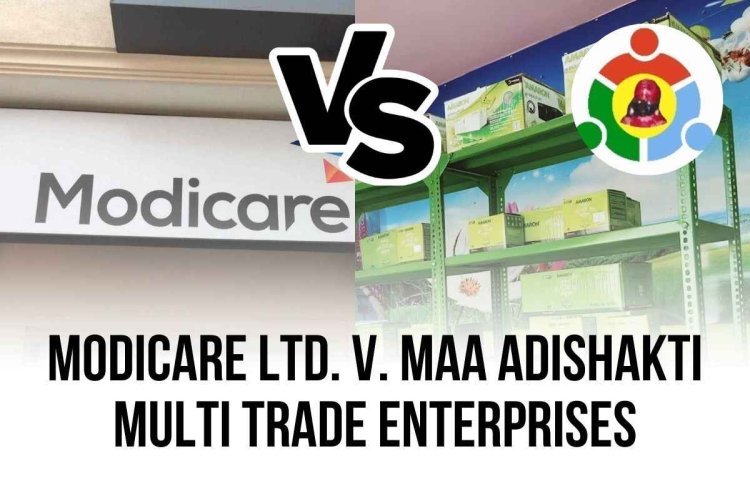Modicare Ltd. v. Maa Adishakti Multi Trade Enterprises
Modicare Limited, a prominent Indian conglomerate specializing in fast-moving consumer goods, initiated legal action against Maa Adishakti Multi Trade Enterprises for trademark infringement and copyright violation related to their 'WELL' marks. Despite objections, Modicare had extensively used and updated the trade dress for its 'WELL' marks. The defendant copied several of these marks for their products, leading to confusion in the market. The court, due to the defendant's failure to respond, granted a summary judgment in favor of Modicare. The judgment permanently restrained the defendants from using any formative 'WELL' marks, deceptively similar variants, or reproductions of Modicare's artistic features. The court also ordered the takedown of online listings for infringing products and awarded actual costs in favor of Modicare, with the defendant liable to pay Rs. 11,63,650.

Modicare Ltd. v. Maa Adishakti Multi Trade Enterprises
SCC OnLine Del 6514
Decided on 13-10-2023
Background of the case
The plaintiff in this case is Modicare Limited, which is a leading Indian conglomerate that manufactures, markets, and sells a wide range of fast-moving consumer goods. Their products include food processing items, agriculture chemicals, personal care products, nutraceuticals, and health care products. The plaintiff has more than 196 support centres, 865 Stock Keeping Units, and 3,80,000 active Modicare consultants. They have adopted the well-known mark 'WELL' in 2004, along with the mark 'MODICARE'. The plaintiff has filed a word mark 'WELL' for trademark registration in 2002, which has not been registered yet because of objections. The plaintiff has used a series of 'WELL' marks for their FMCG products. The plaintiff's products with the WELL marks have certifications from prominent agencies and licenses from the Food Safety and Standards Authority of India ('FSSAI'), the Ministry of Health and Family Welfare, which ensure that the products are safe for public consumption and comply with the Food Safety and Standards Act, 2006. The plaintiff has crafted a unique trade dress with distinct elements for each of the 'WELL' marks, making the products easily recognizable with a strong recall value. However, the plaintiff has updated the trade dress for some products, but the original cause of action remained the same, as the products with the old trade dress were still available in the market. The plaintiff claimed that the characteristics of the labels adopted by them for the products sold under 'WELL' marks constituted artistic works under the Copyright Act, 1957.
The plaintiff has filed a suit against the defendant for using their marks 'WELL INTELLECTE', 'WELL KOREAN RED GINSENG', 'WELL D-TOX', 'WELL JOINT-EASE', 'WELL AM-PM', and 'WELL NATUROPAUSE'. The plaintiff claimed that the defendant had copied these marks identically. The plaintiff discovered that the defendant's products were available on various online portals, and the defendants were jointly manufacturing and offering for sale the plaintiff's products on various online platforms. The plaintiff was aggrieved by this and filed a suit, and the court granted an ex parte ad-interim injunction for the marks 'WELL INTELLECTÉ', 'WELL RED GINSENG POWDER', 'WELL JOINT EASE', 'WELL AM-PM', and word mark 'SCI VEDIC'. However, the plaintiff did not press for an injunction on the labels 'WELL D TOX' and 'WELL NATUROPAUSE' as their claims for these labels were based on passing off. The defendants were given repeated opportunities to file written statements, but no written statement was filed, and the Joint Registrar closed the right of all four defendants to file the written statements. The plaintiff then filed an application seeking summary judgment under Order 13A of the CPC.
Analysis, Law, and Decision
The Court had the discretion to pronounce the judgment against the defendants since they did not put up any defence, and their right to file a written statement was closed. This was as per Order 8 Rule of the CPC. The Court did not require any evidence on the plaintiff's behalf, especially since the plaint was already filed on the affidavit. The Court observed that the defendants had identically copied the product names and registered them in the form of labels. The defendants were also using trade dress that was deceptively similar to the plaintiff's products, suggesting an attempt to affiliate or capitalize on the plaintiff's goodwill. Such activity could lead to confusion in the minds of the consumers, as there was a possibility of the defendant's products being passed off as the plaintiff's. The Court opined that the defendant's products were likely to be confused with the plaintiff's, as the brand names and product categories were identical. The Court relied on settled legal positions and permanently restrained the defendants from manufacturing, selling, or offering for sale any cosmetics, wellness, or nutraceuticals products under the formative 'WELL' marks or any other deceptively similar variants for the formative 'WELL' marks, which constituted infringement. The Court further restrained the defendants from reproducing, printing, or publishing any label or packaging that was a colourable imitation or substantial reproduction of the artistic features of the plaintiff's 'WELL' marks and their depiction in artistic writing style, layout, get-up, colour scheme, etc., which infringed the plaintiff's copyrighted labels. The Court clarified that the present order did not recognize monopoly or exclusivity for the plaintiff's 'WELL' marks and directed that the online listings of the defendant's product should be taken down from the defendants' and any third-party websites. If the defendants did not take them down within two weeks, the plaintiff was free to write to all online platforms to seek the delisting of these infringing products. The Court granted actual costs in the plaintiff's favour, and the defendant was liable to pay a sum of Rs. 11,63,650.












